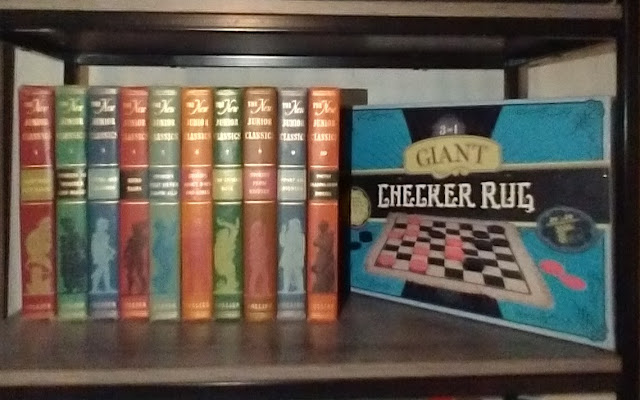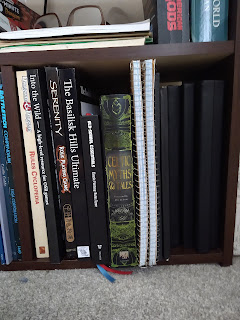 |
Even dusty old thieves
are cool. |
It's been a bit since I posted, so let's have an update. The counter to the right displays 25 days or 209 if you jumped into Old School Essentials' Kickstarter. I find myself putting stuff away lately rather than reading or gaming, which obviously decreases my post count.
In my last post, I talked about table trouble. This one could have been called "Theif Envy", but the concepts are one and the same and tie back to OSE.
I used to alternate between D&D and Star Frontiers campaigns (links go to DriveThruRPG). The idea of rolling against a skill is baked into Star Frontiers but is an add-on to D&D. Thieves have an array of skills that no one else has. Sure races have percentage skills for detecting doors and sloped passages, but a dwarven Thief character is like no other.
It makes other class players envy those skills.
Now I actually remember when the idea of rolling for certain actions came to my table. The party was at the last door in the dungeon and had plenty of warnings that the exit door would be trapped. The Thief took the lead and easily detected the dart trap in the oversized, dragon-shaped door handle. Then THE PLAYER got cocky.
"I'll detect for poison!" he shouted.
"You found some!" I shouted back.
It was too good to pass up. I made him roll against his constitution score. He failed and was paralyzed. The party escaped, dragging the butt hurt Thief behind them, but as they closed the door on the dungeon, I could not close the door on "ability rolls".
Oh, man. What a can of worms. Not because it's hard, but because it's so easy. Like being pelted with dice.
 |
Perversion is too many die rolls
in a role-playing game. |
"I'll roll for this..."
"And I'll roll for that..."
The one thing that could have stopped this from happening was a simple and clear acknowledgment of the player's humor vs. the character's intent. There was no way that character was that stupid. Or funny for that matter. Every other social encounter this character and player had was decidedly taciturn or even sour.
I shouldn't have let it happen, but I happen to like this style of play... To a degree.
If a character needs to do something that can be described easily and doesn't invoke any sort of fantastic ability, the die roll itself is suspect. As much as some people can be funny like the aforementioned thief, some people's reactions to situations can be just as good.
When the player of the Fighter hears a threat from an opponent and puts on their game face, the perfect, bone-crushing game face, he or she shouldn't roll for anything. They are not intimidated and perhaps turnabout happens where the mouthy NPC has all of his buddies fail a morale check right from the start, leaving the Fighter and the Mouth to work it out.
You see how that's different, right? A morale check is hardcoded into the rules. But an ability check isn't. What would I have a Fighter roll against for bone-crushing aggressiveness?
No idea.
In all cases, I believe the characters should be able to do whatever they want when they want. It might not work out, but you know, I let them try. Unless someone proposes a task that maps directly to an ability score, I don't want the roll.
A trivial example is leaping on or off horses. I'm not rolling for that because 99.99999% of the time, the action is merely flashy and not necessary. The times when it's necessary, eating a face full of dirt is better than what would happen.
A not-so-trivial example is when the party or player comes up with the perfect plan, one that seems to have no flaws or problems and is delivered with confidence and flair? So long as all of their assumptions are correct, what is a roll going to do to improve the situation?
Nothing at all.
I can give a hysterical example of not rolling. I had a Magic User with a fly spell that he used all of the time. He got his hands on a ring of delusion, which he believed was a ring of flying.
"Oh, shit," muttered the rest of the party.
In talking this out with the DM, we decided that it was really a ring of double delusion. Not only did my character believe it was a ring of flying he would also be deluded into forgetting that he cast a fly spell to make it work. So the ring appeared to be a ring of inconsistent flying.
This was preferable to making a saving throw against the ring's influence. We kept track with a token, when I cast my one and only fly spell or invoked the ring's power, I handed over the token to the DM. Without the token, any attempt to fly would fail, usually with disastrous results.
My character would suggest ariel solutions to every problem even if it wasn't reasonable to fly at all. Again, this is a ring of delusion after all.
In Old School Essentials, you generally have a 1 or 2 in 6 chance of pulling some random activity for a skill that isn't quantified. That's a great compromise because usually, these events don't map at all to a skill.



















